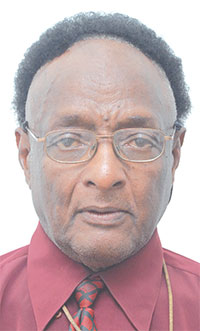TWO Robbery with aggravation appellants, Samaroo and Ezaz whose ‘Alibi defence’ was inadequately put to the jury by the trial judge in summing up, resulting in the jury returning verdicts of guilty in 1953 against both accused.

The accused who were sentenced to imprisonment appealed the decision.
The Appellate Court, constituted by Chief Justice Bell, Justice Boland and Justice Wills, heard the appeals.
Their defence at their trial was an alibi.
They appealed on the grounds that their defence was not adequately put to the jury by the trial judge in his summing-up.
Allowing the appeals, the Court held: It is of paramount importance that the judge in his summing-up must fairly put an accused’s defence to the jury, and as that had not been done in an otherwise careful and meticulous summing-up the convictions and sentence must be quashed.
B. O. Adams for Appellants.
G.M. Farnum, Solicitor General for Respondent.
At the conclusion of the arguments, the judgment of the Court was delivered by Chief Justice Bell.
According to C.J. Bell: These appeals, which were heard together are appeals against convictions and sentences. The appellants had appeared
before the judge and a jury on charges of robbery with aggravation .
Learned counsel for the appellants argued a number of points. He abandoned two of the points recorded in the grounds of application for leave to appeal.
We are against him on two other points, namely, that there was no proof of what the grounds of appeal call ownership, and that the possession of the stolen goods, the money, was not fully established. We are against the appellants on those two grounds.
The main grounds argued were that the learned trial judge failed to include in his summing-up the defence as led and that the learned trial judge failed in his summimg-up to deal fully with the evidence of the prosecution, particularly with the cross-examination of the witnesses. We have had the benefit of considerable argument by learned counsel for the appellants, to which the learned Solicitor General replied.
Now as regards this particular case, we have come to the conclusion that in an otherwise meticulous and careful summing-up by the learned trial judge, who is careful and meticulous, it cannot fairly and reasonably be said that the defence of either of the appellants was put to the jury clearly or in such a way that their attention was sufficiently and emphatically drawn to the nature of that defence.
It cannot be enough, we feel, merely to assume that because the jury had hear both sides of the case they are cognisant of the defence which is put forward.
Something more than that is necessary. Something must be done to emphasise to the jury the defence which an accused person is offering.
Now unquestionably, throughout the learned trial Judge’s summing-up he did make reference to statements which had been made by the two appellants, but we are of the opinion that he did so for purposes other than the purpose of putting the defence to the jury in the way we feel it ought to be put .
It would not “be enough, we feel, to say: “Well, when these statements were being dealt with by the learned trial Judge it must have must have been apparent to the jury that the statements raised the defence of an Alibi in each case.”
Something considerably more than that was required in our view, so we are left in the result with the view that at no stage can it be said that the defence, as put forward by the appellants, was sufficiently, clearly and emphatically put to the jury and we are forced to the conclusion that that very vital principle has been infringed.




.png)









